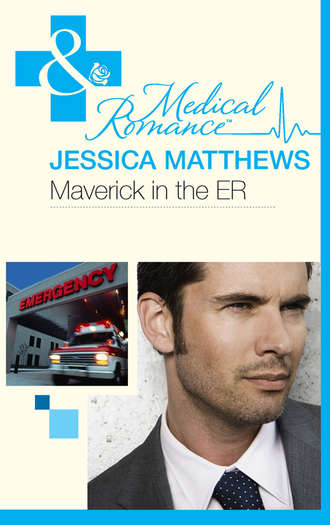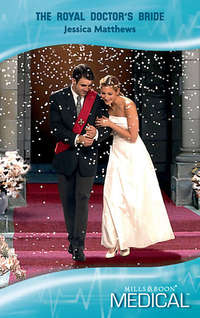
Полная версия
Maverick In The Er
“No, you’re not,” she said, shaking her head. “I’ve seen you lots of times.” She scurried in front of Sierra and peered at her identification badge. “You’re Dr. McAllaster. Your name tag says so.”
“Yes, but—”
“I’m Hannah,” she answered. “Now we aren’t strangers anymore.”
Hannah’s logic was definitely lacking. “Actually, we still are strangers,” Sierra corrected her gently. “I could be a not-very-nice person.”
Hannah’s ponytail bounced with each shake of her head. “Nope, you’re not. I’ve been watching you ‘cause you come here almost as much as I do. If you were a rotten person, you wouldn’t feed the birds your leftover crackers.”
Goodness! Had she been so self-absorbed that she hadn’t noticed an unattended child before today? Or maybe she’d seen her and thought she’d been under the watchful eye of one of the many visitors who came to the garden for fresh air and sunshine. Regardless, it was still eerie to realize that someone had observed her so carefully without her knowledge. She would definitely have to pay closer attention to her surroundings in the future.
“Plus, you’re a doctor. Doctors aren’t mean people. Oh, they can do nasty things like give us a shot, but it’s for our own good,” she said confidently.
While Sierra agreed that most physicians were caring individuals, she personally knew of several who should have chosen a different profession. Even so, she wouldn’t destroy the girl’s illusions. Life would take care of those soon enough.
“A lot of people come here to walk, don’t they?” Hannah asked.
“They do.”
“My uncle says they built this because the lab-y-rinth,” she stumbled over the word, “is supposed to make people feel better. The Native Americans call it a medicine wheel.”
“Really?”
“Uh-huh. They’ve gotten really popular, he says, especially at hospitals. Walking the path helps people who have stuff like high blood pressure or who can’t relax. He says that the twists and turns are s’posed to represent the twists and turns in life.”
The child sounded like a brochure that detailed the hospital’s services. “He’s right. The labyrinth helps people put the bad things in perspective.”
“Is that why you’re here? So you can put the bad stuff in pers…pers…pective?”
Hannah’s insight surprised her. Sierra began visiting the garden during her lunch hour as part of her mental-health regimen when she’d first joined the medical staff. Walking the circular concrete pathways, which were lined with colorful petunias, helped her deal with stress, especially after she lost a patient. She also knew of several surgeons who walked the labyrinth in order to clear their heads before performing surgery.
“Yes, I do,” Sierra said. “Why do you come here? To be outdoors instead of being cooped up inside?”
Hannah shrugged. “I like this place. My mom died of cancer when I was little, and whenever I get sad, I walk until I feel better. Do you think she might have lived if there’d been a lab-y-rinth at her hospital?”
Hannah’s matter-of-fact tone didn’t minimize the compassion Sierra felt for her. Oddly enough, she almost wanted to give her nameless uncle a break. Being a single parent or, in this case, an uncle wasn’t easy, especially when one dealt with an obviously precocious child like Hannah.
“Sometimes cancer wins, no matter how hard people try to fight it.”
Hannah’s brown eyebrows drew together as she nodded. “That’s what my uncle says, too. He says she didn’t want to die, but it wasn’t her fault she couldn’t stay and watch me grow up.”
“No, it wasn’t,” Sierra agreed.
Oddly enough, her uncle seemed to have imparted good insight to his niece. Sierra added one mental point in his favor.
Suddenly, the sound of dogs barking broke the quiet. Hannah immediately pulled a hot-pink cell phone out of the matching pouch hanging around her neck and the barking stopped. Sierra chuckled at herself as she realized the noise was a ringtone instead of a pack of canines on the loose.
The youngster glanced at the display and winced. “Gotta go. ‘Bye!”
“Wait! “ Sierra called as Hannah began hurdling the flowers with an easy-limbed grace in her haste to head toward the north door. “What’s your uncle’s name?”
Hannah simply smiled and waved before she disappeared through the north door.
So much for discovering the child’s identity, Sierra thought as she watched Hannah somewhat benevolently. Knowing Hannah had a cell phone made her feel somewhat better about the situation.
To Sierra’s disappointment, her wristwatch showed her allotted break time was over, too, even though she hadn’t reached the center of the labyrinth. After taking one last look in Hannah’s direction and seeing her disappear through the glass entrance doors, Sierra carefully stepped over the petunias as she strode in the opposite direction and disposed of her apple core in the trash.
Inside the main emergency hallway, ringing telephones, whispering gurney wheels and excited voices contrasted sharply with the tranquility she’d left behind. Directly ahead, she saw two different paramedics from the ones she’d met earlier, another ED physician and a nurse escorting another gurney into a trauma room. Meanwhile, Trey was heading toward an exam room as he reviewed the form on his clipboard. As soon as he saw her, his smile widened.
“How was lunch?” he asked.
She thought of the precocious Hannah. “Interesting. Why don’t I take over for you so you can take your break?”
“Thanks, but this case shouldn’t take too long. It’s also too early to meet my lunch date in the cafeteria, so I might as well earn my pay.”
She should have known. The man probably arranged his personal schedule months ahead. “Then I won’t keep you.”
Before she turned away, he stopped her. “Save tomorrow for me, though.”
She paused. “Excuse me?”
“Lunch. Tomorrow. My treat. It’ll be my official ‘welcome to the department’ gesture.”
“Do you take every new person to lunch?” she asked.
“Everyone,” he reassured her. “Even the housekeeping staff. So don’t pack your apple.”
She stared at him in surprise. “How did you know—?”
“I’m an observant kind of guy.”
Of course he was, she thought wryly. “Okay, fine. We’ll do lunch.” Then, to make certain there would be no misunderstandings, she added, “Strictly between colleagues.”
His smile seemed as broad as his shoulders. “Fair enough.”
She turned away, but he stopped her. “Out of curiosity, are you seeing anyone?”
This time she smiled. “What does the grapevine say?”
“You’re not.”
“Correct, as usual,” she agreed lightly.
“Is there someone back home?” he pressed.
Sierra hesitated. How could she explain, and did she want to? However, if her answer prevented speculation and stopped people from pushing her towards every eligible man who came along, why not?
“There was,” she replied slowly.
“Breakups are tough,” he agreed, his expression sympathetic. “So you came to Pittsburgh to start over?”
If only it had been that simple. “I did, but the situation is a little more complicated than a mere breakup.” She met his gaze. “When I left North Carolina, I left my husband in the Fairview Cemetery.”
CHAPTER TWO
TREY didn’t know what had possessed him to broach the subject of her personal life. Perhaps he’d simply been looking for an excuse to stay away from Sierra and hearing of a fellow back home would have provided it. Perhaps he was simply a glutton for punishment and hearing of her unattached status would only provide a temptation he’d be hard-pressed to resist.
Unfortunately, her response had been completely unexpected. He’d certainly never dreamed that the man she’d left behind had been her husband, much less that he was dead.
Certainly, the information she’d shared explained so much—her long hours, her avoidance of the dating scene, and her move to a new city and work environment. She hadn’t come to Pittsburgh on some grand adventure to see the world. Like his brother, Mitch. Sierra was picking up the pieces of her life.
All of which proved his theory—the best relationships were temporary.
“I’m sorry,” he murmured.
She nodded, apparently accustomed to hearing condolences if her frozen expression was any indication. “Thanks,” she murmured. Then, with a visibly shaky hand she smoothed her hair. “Are you sure you wouldn’t like me to see your patient?”
Her abrupt change of subject couldn’t have been more plain. Their question-and-answer period had come to a close, which was good. For a man who never had trouble finding something to talk about, he was suddenly at a loss for words.
He glanced at his watch. He only had ten minutes before his cafeteria appointment and it took nearly seven to walk there. “Do you mind?”
“Not at all. Enjoy your lunch.”
Eager to get away before he asked more questions, Sierra pulled the clipboard out of his hand and headed down the hall. She’d already shared more than she’d ever planned, and if she gave him enough time, the inevitable “What happened?” would follow.
She simply didn’t want to go there. Not now. Not yet. The tragedy had occurred over a year ago and she simply refused to dredge up those old feelings of shock, despair and anger, not to mention guilt. She’d finally come to the acceptance stage, but it hadn’t been easy.
Now, however, was not the time to walk down memory lane and analyze the past. At the moment, the only person who deserved her full attention was her patient—not Trey Donovan, and certainly not David McAllaster.
By the time she’d received the results of Karen Maxwell’s strep screen—it was negative—and referred her to an ENT specialist to evaluate her chronic sinusitis, Trey had returned, looking as rested and refreshed as he had before their full morning of traumas and regular patients.
As Sierra sank onto a chair in the nurses’ station, she noticed he was chatting up one of the radiology techs. The poor girl was smiling as if he’d single-handedly hung the sun, moon and stars.
“He has quite a knack with the women, doesn’t he?” Sierra mused aloud to Roma, who was clicking away on her keyboard at a nearby terminal.
“You must be talking about our famous Dr. Donovan,” Roma answered, without glancing away from her screen.
“How did you guess?”
“He does have a way with people,” she commented. “Young, old, male, female, staff, patients, it doesn’t matter. Why, I’ve seen him talk the most recalcitrant patients into behaving. When he’s on duty, things just run more smoothly.”
Sierra understood why. By virtue of his personality, he inspired people to dig deeply and give one-hundred-and-ten percent.
Just like David.
The only question was, did Trey do it for personal gain, or was he as altruistic as everyone believed? She wasn’t quite convinced of the latter.
Roma finally glanced away from her screen to direct her gaze down the hallway. “He’s so sweet to all of us. In fact, everyone fancies themselves a bit in love with him,” she remarked.
“I’ve gotten that impression,” Sierra said wryly. “Given the way women act when he’s around, I’d bet he never spends an evening alone. I’m surprised he has the energy to come to work.”
The nurse laughed. “There’s where you’re wrong. He doesn’t date as often as you might think. Oh, there are a lot who’d give their right arm for a night with him, but he’s very careful about who he takes out. And he never sees anyone more than a handful of times.”
“Really.” Sierra wasn’t convinced, but Roma seemed to know what she was talking about. “I find that hard to believe.”
Roma shrugged. “It’s true. Dr. Donovan seems like a happy-go-lucky sort, but don’t let his winning ways fool you. There’s a lot more to our good doctor than meets the eye.”
Sierra watched as the X-ray tech walked away with a light step, her face beaming in obvious delight over her encounter with Trey. Meanwhile, he wore his own satisfied expression, which suggested he’d gotten whatever he’d wanted.
Just like David, she thought with some disgust. Everything was a game, nobody was anything more than a chess piece. Thank goodness she’d grown wise to such manipulations. She’d been a pawn once in her life. She wouldn’t be one again.
After finishing with his next patient, Trey strode back to the doctors’ office. He’d requested a CT scan for one of his patients with a debilitating headache and Lila, the X-ray tech, had promised the images would be online by two o’clock. It was five minutes till, so he didn’t expect to see them posted, but it didn’t hurt to check.
He accessed Joan Villiers’s computer file and, as he’d suspected, the CT scan was still pending. A brisk knock at the door heralded Roma’s arrival.
“I’ve been looking all over for you,” the nurse remarked as she entered.
“What’s up?”
“Frances is here.”
“What’s wrong today?”
“Stomachache. Do you want me to give her to Dr. McAllaster?”
He thought a moment. “Yeah, but I’d better introduce them first, don’t you think?”
“Probably. Although I think the introductions are more for Dr. McAllaster’s benefit than Frances’s.”
“Right as usual.” Because he was curious, he asked, “From a nursing point of view, what’s your opinion of our new doc?”
Roma didn’t hesitate. “I think she’s doing okay. She’s a little tense, especially during traumas, but other than that I don’t have any complaints.”
“It’s her first day,” he reminded her. “She’s bound to be a little tense.”
“Hey, I wasn’t finding fault,” Roma protested. “Only making an observation which, as you said, is only to be expected. Now, if she’d come in all cocky and acting like a know-it-all, then I’d worry.” She patted Trey’s shoulder. “You done good, Doc, when you convinced them to transfer her to us.”
Pleased by Roma’s praise, he smiled. “I did, didn’t I?”
“According to the nurses on the fifth floor, they’re extremely upset because we stole her away.”
“It’s only for sixty days.” More or less.
“Yeah, well, they’re afraid they won’t get her back. According to them, she knows her stuff. Better yet, and unlike some doctors who shall remain nameless, she doesn’t treat them like they’re too stupid to live.”
“We were fortunate she came to Good Shepherd,” he commented, keeping the story Sierra had shared to himself. If she wanted everyone to know she was a widow—and she obviously didn’t if the information hadn’t circulated on the grapevine—she could divulge that news herself.
“Rumor says she didn’t want to be assigned to the E.R.,” Roma pointed out. “As you’re the one responsible for her transfer, I hope you intend to turn on the charm until she settles in.”
“Hey, I only made the suggestion,” he protested. “The decision came from people above my pay grade.”
“Be that as it may, if you hadn’t pushed for her, she wouldn’t be here.”
Roma was right. If he hadn’t waged his one-man war, his department would still be suffering from the lack of a physician. “Probably not,” he agreed. “We were lucky the upper echelon saw the situation from our point of view.”
Roma sighed. “I wish she’d applied for the E.R. post in the first place. Everything would be settled. As it is, who knows what her replacement will be like? “
The same thought had crossed Trey’s mind on several occasions. “I’m hoping she’ll grow to love us and will stay.”
“Hope all you want,” Roma said darkly, “but given how other physicians feel about E.R. docs, my money says she’ll run back to the fifth floor as soon as she can.”
Not if he could help matters… “I assume you’re referring to how the rest of the physicians look down on us because of the popular belief that we only decide on whether or not to admit a patient.”
“Yeah.”
It was a common stereotype, thanks to the nature of his profession. The people who presented themselves were either bleeding or sick and it was his job to either cure them or pass them off to someone who could, doing both as fast as possible. The department wasn’t called Emergency for nothing. Being the metropolitan city that Pittsburgh was, their ED never had a dull moment.
“We may not have an official client list like a private practice does, but we definitely have our regulars,” he mentioned.
“Like Frances.”
“Like Frances,” he echoed. “A lot of people list us as their primary-care physicians.”
“Probably,” Roma agreed, “but I’ll bet Dr. McAllaster feels as if she’s taken a step down in her career. Mind you, the nurses have a saying. ‘If the doctor ain’t happy, then nobody’s happy.’”
Trey disagreed. So far, Sierra hadn’t lost her temper or raised her voice and she’d been in various situations where it wouldn’t have been inappropriate. While staying calm was a great trait to exhibit in an emergency situation, over the past few months of their quasi working relationship, from what he’d seen, the woman gave the word unflappable new meaning.
“I think you’re wrong,” he said. “Sierra is too classy a lady to take out her frustrations on the rest of us.”
“She might be classy, but redheads can have fiery tempers.”
As far as he was concerned, calling Sierra a redhead was like describing the Perseid meteor shower as a few shooting stars, or the Grand Canyon as a big hole in the ground. “I’m not sure one has anything to do with the other. I’ve known lots of hot-tempered brunettes and blondes, too.”
“Okay, so I’m stereotyping,” she admitted, “but we’ll see fireworks down here before it’s over.”
He was half-eager for Roma’s fears to come true. Sierra, with her brown eyes flashing with the same fire he saw in her hair, would be an awesome sight. “Fireworks can be beautiful.”
“Yeah, in the night sky off the Roberto Clemente Bridge. Not in the hospital and without any warning.”
“I thought you liked to live life dangerously.”
“Me? Mrs. Boring who’s married to Mr. Extremely Boring?” She shook her head, smiling. “Not a chance. As much as I like my job, it has enough inherent aggravation without me looking for trouble. Speaking of which, the sooner we take care of Frances, the better.”
“Okay, but I have to check my CT scan result first. If everything looks okay and the injection we gave Mrs. Villiers is working, we can send her home.” A few keystrokes later, he found his report and read it with satisfaction. “Sure enough. She can go.”
After sharing his news with Mrs. Villiers, Trey found Sierra at the nurses’ station, ready to grab another clipboard out of the in-box.
“Before you take that case, I have a person I want you to meet,” he told her. “Room Ten.”
“A patient?”
How could he describe Frances? “Yes and no,” he admitted.
Her answering chuckle sounded sweet. “Which is it?” she asked.
“Frances is one of our colorful regulars. She’s a twenty-five-year-old woman with a learning disability who lives about a block away. Her mother used to work here and so she understands that the Good Shepherd E.R. is where people come for help.”
“Okay, so what’s unusual?”
“When I refer to ‘help,’ I’m using an extremely broad definition.”
“How broad is broad?”
“She comes in for minor things like a sliver in her hand, a skinned knee or a broken blister. She usually goes straight to the triage nurse, who finds out what she needs. Then, the nurse sends her to me or to one of the other doctors if I’m busy. We give her a little TLC and send her on her way.”
“I assume that I’m ‘one of the other doctors’?” she said dryly.
“Do you mind? “
“Not at all.”
“Good, because if you ever do see her, her visit will go easier if I’ve introduced you.”
“Okay. What’s her complaint?”
“Stomachache.”
She glanced at his empty hands. “Where’s her paperwork?”
“We don’t create any.”
Sierra stared at Trey. “No paper trail?”
“Like I said, she comes relatively often with such minor problems that we’d waste more time filling out forms than if we’d actually deal with her situation.”
She’d been warned of Trey Donovan’s unorthodox style, but she hadn’t expected to find an example of it so quickly.
“A few administrative people might be upset by the way you’re handling this individual,” she commented cautiously, to test his response. “Treating a patient without documentation. Legal liability issues, etcetera.”
He shrugged as if he was unconcerned. “I suppose they might be unhappy if Frances sues us for not removing a splinter properly. Until then, I guess you’ll have to decide if you’ll keep our secret or not.”
Sierra ignored the challenge in his voice. “Have you encouraged her to visit the outpatient clinic instead of the E.R.?”
“Frances has come here since she was a little girl so the concept is ingrained in her. Do you want to try and change her belief system at this late date?
“Besides,” he continued, “the clinic staff doesn’t know her like we do. They won’t take time for the minor things and if they do, they certainly won’t operate out of the goodness of their hearts. She won’t understand when they turn her away or ask her to pay, and then she’ll get upset and fall apart, which I can assure you is not a pretty sight. It saves so much wear and tear on everyone if we just do what needs to be done. A regular win-win situation.”
Sierra wanted to argue that Frances’s caseworker needed to be involved, but several things stopped her.
One, she was intrigued by how the ED staff had literally taken this woman under their wing.
Two, this was Trey’s domain. As the most senior ED physician, he knew his department’s strengths and limitations far better than she did. He also had the authority to establish policies and procedures, with or without his immediate supervisor’s approval. If he wanted to handle Frances in his own way, he certainly had the clout to do so.
This also seemed to be a prime opportunity to either build a bridge or a brick wall. She could stick to the hospital rule book, which would earn her brownie points from her superiors, or she could save her energy for more important battles.
On the other hand, if she caved in on this issue, was she setting a precedent? What if ten more people like Frances decided to visit the E.R. for their scrapes and scratches? They’d never have time or space to deal with the heart attacks, the broken bones or the car wrecks.
Would turning a blind eye signal that she was a pushover for a heartwarming story or a special case? The argument could be made that every person coming through the doors had special circumstances necessitating unusual solutions.
Can’t you be flexible for once in your life?
David’s voice whispered the last question and she instinctively stiffened. Unfortunately, his concept of flexibility had been his excuse for taking advantage of every opportunity that had come his way—opportunities that had covered everything from his business activities to moral decisions.
She’d always prided herself on meeting the needs of her patients, so how was this any different? If Frances had been one of her regular clients, would she have chosen differently than Trey and his staff had?
She let out a breath and nodded. “Let’s see Frances.”
Before she could take a step forward, he stopped her.
“If it looks like she has something serious, I want you to take over.”
“Why?”
“Because if I’m busy holding her hand to keep her calm, I can’t do my doctor thing.”
She chuckled at his choice of words. “Can’t walk and chew gum at the same time, eh?”
He rolled his eyes melodramatically. “Ah, now she makes a joke.”
“Sorry,” she said, unrepentant, “I couldn’t help it. Okay, we’ll do it your way. I’ll examine her while you play nursemaid. From what I’ve seen so far, you’re pretty good at handholding and sweet-talking.”








